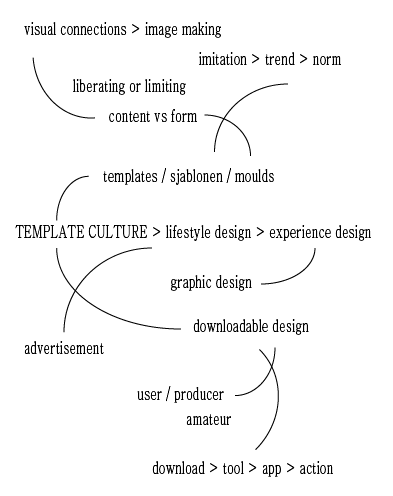User:Marlon/Graduate Research Seminar/thesis/reading: Difference between revisions
No edit summary |
|||
| (2 intermediate revisions by the same user not shown) | |||
| Line 8: | Line 8: | ||
; [http://opendesignnow.org/index.php/article/the-generative-bedrock-of-open-design-michel-avital/ The Generative Bedrock of Open Design, Michel Avital] | ; [http://opendesignnow.org/index.php/article/the-generative-bedrock-of-open-design-michel-avital/ The Generative Bedrock of Open Design, Michel Avital] | ||
; [http://opendesignnow.org/index.php/article/redesigning-design-jos-de-mul/ Redesigning Design, Jos de Mul] | ; [http://opendesignnow.org/index.php/article/redesigning-design-jos-de-mul/ Redesigning Design, Jos de Mul] | ||
: | ;Transductions, Adrian Mackenzie (2002) | ||
: Chapter 1, Radical Contingency and Technology | |||
; | ;[http://constantvzw.org/verlag/spip.php?page=article&id_article=23&mot_filtre=9&id_lang=0 Skeleton, Corset, Skin, Femke Snelting] | ||
; Sorting Things Out, Geoffrey C. Bowker and Susan Leigh Star (2001) | |||
; | ; Print is Flat, Code Is Deep, N. Katherine Hayles | ||
: | Future possible reading: | ||
* Lampand, M and Star, S (2008) Standards and Their Stories | |||
* de Rijk, T (2010) Norm=Form | |||
* Andrejevic, M (2004) Reality TV <br> | * Andrejevic, M (2004) Reality TV <br> | ||
| Line 36: | Line 32: | ||
* Manovich, L (2008) Software Takes Command | * Manovich, L (2008) Software Takes Command | ||
Latest revision as of 11:14, 28 January 2014
Reading list
January
I've been reading, in messy order:
- Transductions, Adrian Mackenzie (2002)
- Chapter 1, Radical Contingency and Technology
- Sorting Things Out, Geoffrey C. Bowker and Susan Leigh Star (2001)
- Print is Flat, Code Is Deep, N. Katherine Hayles
Future possible reading:
- Lampand, M and Star, S (2008) Standards and Their Stories
- de Rijk, T (2010) Norm=Form
- Andrejevic, M (2004) Reality TV
- Galloway, A (2012) The Interface Effect
- Manovich, L (2008) Software Takes Command

